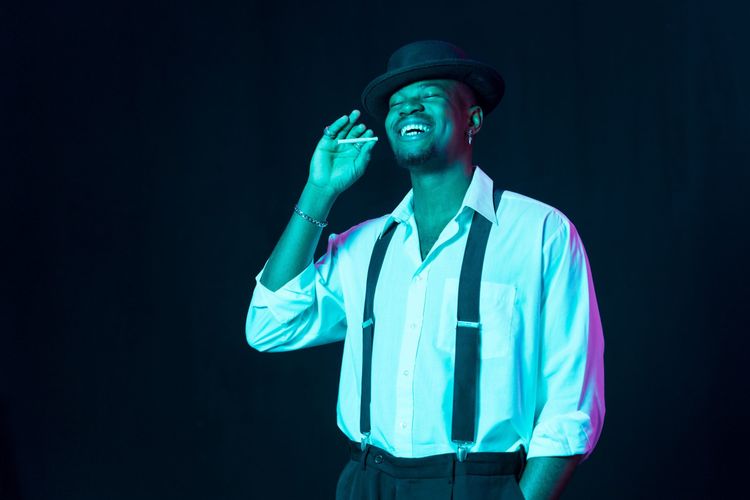How to Beat Your Anxiety with Mental Jiu-Jitsu

Have you ever heard this quote from Dune?
I must not fear. Fear is the mind-killer. Fear is the little-death that brings total obliteration. I will face my fear. I will permit it to pass over me and through me. And when it has gone past, I will turn the inner eye to see its path. Where the fear has gone there will be nothing. Only I will remain.
“I will permit it to pass over me and through me.” Permit is the keyword here. The protagonist allows himself to feel his fear.
Anxiety makes us run from and try to prevent an imagined disaster. We want to do everything we can to remove the painful feeling of uncertainty and return to safety.
But the more assurance we give ourselves, the greater the feeling becomes. If we plug our ears and say, “I’m not listening. I’m not listening,” anxiety only grows larger. This is true for any feeling.
The solution to anxiety is not to try and erase it. It is to be with it, witness it, listen to what it has to say, and then let it float on by.
Melting Your Emotional Blocks
Nathaniel Branden was a psychologist who specialized in self-esteem.
Here is Branden’s philosophy on emotions, according to Psychology Today:
“…we must accept all our feelings without censorship; we should never disown, deny or repress any part of our experience. He points out that to deny our feelings is to keep ourselves in a perpetual state of internal conflict. The more you distance yourself from your feelings, the more disempowered and out of touch with your true self.”
If you want to raise your self-esteem, you need to be honest about what you feel and what refuse to let yourself feel.
Branden would task his clients with radical acceptance. Accept how you feel, he would tell them, and the emotional blocks will give way to healthier feelings.
When clients had trouble doing this, he would tell them to say, “I accept that I can’t accept this.” And if they still couldn’t do it, he would tell them to “accept that you can’t accept that you can’t accept this.” Eventually, they would say, “ok, I can do that.”
Constantly forcing yourself to feel something blocks you from genuine emotion. Refusing to feel difficult feelings keeps you stuck with them.
Anxiety is the toughest example of this.
Accepting Anxiety Is the First Step
When I used to get anxious, I would do everything in my power to make the feeling go away. I wanted to feel reassured at all costs and escape the discomfort. In fight or flight, I was all about the flight.
But I’ve learned since then. The main strategy for fighting anxiety is to yield to it, in a Zen master kind of way. Here are my mindsets and strategies for dealing with anxiety and painful emotions:
Understand How It Works
Anxiety always behaves like a bell curve. Even if you do not manage it, there will be a growth, a peak, and a dip back to baseline. This can take hours, but it will behave this way no matter what.
I think of it as a thunderstorm; the worst moments of anxiety and pain are when the thunder is crashing right above your head. But eventually, the storm will pass to the next town because that is what storms do.
Don’t Try to Get Rid of It
I let my anxiety be as it is. I do this because I know that trying to get rid of it can be a product of the same anxiety. You know how you can feel anxious about feeling anxious, and that makes the feeling grow?
You need to recognize that trying to eliminate anxiety only brings you further down the rabbit hole. You stop the vicious cycle when you see that you can’t get to a calmer state by thinking. Only by sitting, and feeling, like a monk.
Sit and Listen
Instead of trying to run away from your anxiety, listen to it. Notice what’s happening in your body. Feel how heightened your senses are. You don’t need to be a meditation master to observe your emotions. Listening to your feelings is what gives them a chance to change.
Describe It
Use your imagination and describe what anxiety feels like to you. This gives it a sense of familiarity. I describe my anxiety as a massive bonfire, or a volcano, or a burning forest, usually something hot. This turns an anxious moment into an opportunity for self-understanding and creativity.
Act Despite It
Motion creates emotion, and action changes your feelings. Anxiety prevents us from doing what we need to do. It wants to protect you from danger, but eventually, you realize that these feelings no longer serve you.
Acting despite fear shows you what you’re capable of, and it allows you to see anxiety in a different light. You come to see it as just a dog that barks in the background while you do the things that matter to you.
We Live in an Anxious Era
Who isn’t anxious?
Anxiety is so common that you can assume most people you meet have a history with it. They try to numb it with pills, alcohol, and painful compulsory behavior, myself included. But all that is just running away.
That’s not permitting fear to pass over you and through you. If we can understand fear, we can learn to not let it dictate our existence.
If anxiety is doubt, then the answer to anxiety has to be trust. Trust that we can handle the consequences of our fears should they come to life. Even so, the worst-case scenario rarely, if ever, plays out like our anxiety says it will.
That’s what I try to do now. Instead of anxious clinging, I trust. Working toward self-trust is the best antidote I’ve found for anxiety.



